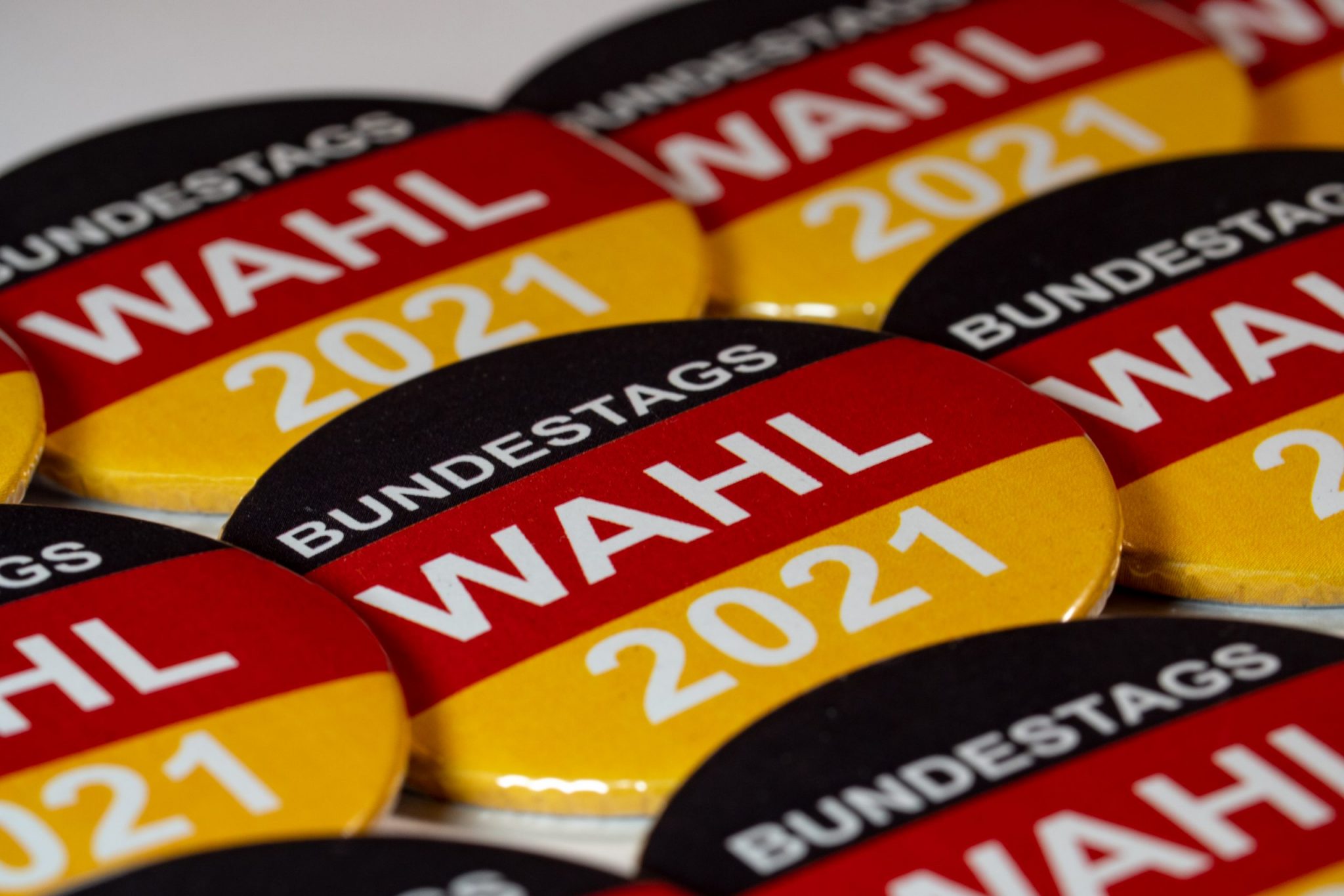On September 26, around 60 million voters in Germany will be able to cast their ballots in the 2021 parliamentary elections. After 16 years in power, incumbent chancellor Angela Merkel is not running for office, and a change in government leadership is certain. Moreover, the current election appears to be as open as ever with three different parties vying for the lead. Politico’s Poll of Polls, a partner of the 2021 German Elections Dashboard, shows that the Christian Democratic Union (CDU), the Greens, and the Social Democratic Party (SPD) have each held the lead in the polls at some point since May.
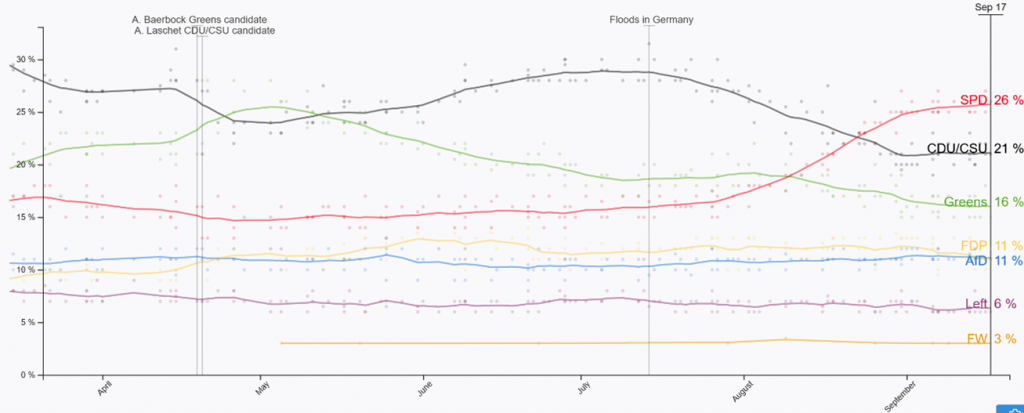
Politico’s Poll of Polls for the German Federal Elections 2021 available at https://www.politico.eu/europe-poll-of-polls/. Politico is a partner of ASD’s German Election Project.
Because of this volatility, foreign influence in the German elections deserves particular attention this year. Our previous months’ analyses have shown that foreign actors have actively engaged in German online political discourse, with Russian state-backed media driving the most engagement and giving the most attention to election-related topics. This trend persisted in August as Russian state-backed actors continued their coverage of the German election campaign, focusing primarily on the CDU’s chancellor candidate Armin Laschet and the Greens’ Annalena Baerbock. Chinese, Turkish, and Iranian state-backed actors focused mostly on their own domestic politics and foreign policy topics relevant to their national interests.
Russia
German Election Campaign
In August, Russian state media continued reporting on the German chancellor candidates, though coverage of the candidates represented a small fraction of Russia’s overall Twitter outputs (roughly 3 percent of total tweets in August). The CDU’s candidate, Armin Laschet, received the most mentions (53), followed by the Greens’ Annalena Baerbock (33). Social Democratic candidate Olaf Scholz was mentioned the least often (29) of the top three candidates. Mentions of Alice Weidel, the AfD candidate, were negligible (4). Similar disparities in mentions were also noted in Russian website articles and RT Deutsch YouTube videos covering the three candidates.
In comparison, German media outlets on Twitter posted by far the most about Laschet (561), with Baerbock (241) and Scholz (313) receiving significantly less attention. Again, there were few mentions of Weidel (8). Proportionally, Russian media tweeted less about Laschet than the German media, more about Baerbock, and provided roughly equal coverage of Scholz and Weidel.
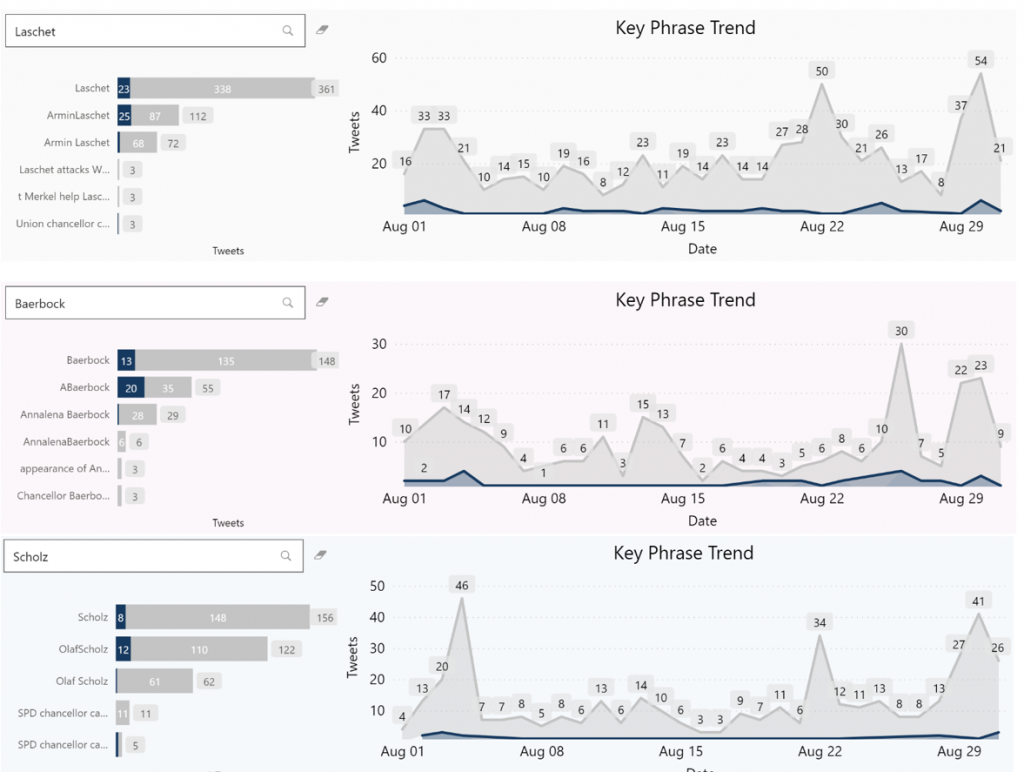
Mentions of chancellor candidates Laschet, Baerbock, and Scholz by Russian state media (blue) and German media (gray) in August.
Russian state media’s most retweeted tweet about Laschet criticized his approach towards Turkish communities in Germany and interviews he gave to Turkish media outlets, alleging that he received campaign support from Turkey. Russia-backed accounts also covered attacks on Laschet by his party rival Markus Söder, and featured a statement in which Laschet advocated for continued equal treatment of vaccinated and people with a recent negative test. Interestingly, the most retweeted tweet about Baerbock mentioned that she is in favor of “discrimination” against unvaccinated people. RT Deutsch also addressed a minor slip by Baerbock: At a campaign event in her constituent state, Brandenburg, she confused two regions. For RT Deutsch, this was indicative not only of Baerbock’s general incompetence, but also of the bigger problem of western German politicians running for office in East Germany without any knowledge of the region. Unlike German media coverage, Russian media coverage did not reflect a rise in mentions of the candidates around the so-called “Triell,” the first televised debate between the three chancellor candidates on August 29th. The most popular Russian post about the debate did not address content at all, but scrutinized politicians for their hypocrisy and their restrictive anti-Covid measures, as they were shown not wearing masks or maintaining social distance behind the scenes of the debate.
RT Deutsch also wrote about a survey by the German research institute INSA, which found that around 18 percent of the respondents expected extensive fraud in the upcoming elections. Interestingly, articles about the survey were only spread by fringe right- and left-wing blogs, as well as blogs that particularly engage with conspiracy narratives and anti-coronavirus measures content. At the time of this analysis, no traditional German media outlet had cited the poll.
Afghanistan
Besides the upcoming election, Afghanistan-related topics dominated Russian coverage. Afghanistan was the most mentioned country, and “Kabul” and “Taliban” were the most-used hashtags in August. The turmoil in Afghanistan was primarily interpreted as a failure of the United States and President Biden. The most liked tweet of the month featured a quotation from the mother of a fallen American soldier calling President Joe Biden a “useless piece of dirt controlled by dementia.” Another popular tweet shared Donald Trump’s call for Biden to “resign in shame” over the handling of the situation in Afghanistan. RT Deutsch also used the situation in Afghanistan to sow doubts and insecurity about U.S.-Ukraine relations. A tweet argued that the alleged unreliability and untrustworthiness of the United States in Afghanistan should also be a lesson for Ukraine to not rely on the United States as a partner, as they have left their allies behind even in situations as dire as in Afghanistan. Moreover, Russian-backed actors also highlighted the Russian government’s supposed superior handling of the situation in Afghanistan portraying the situation in Kabul as calm and contradicting the assessment of European and U.S. governments and media. On August 17, after many Western countries had already started evacuating their embassies, RT Deutsch shared a video in which Russia’s Permanent Representative to the United Nations Vassily Nebenzia explained that there was no reason to evacuate or reduce the Russian embassy since the situation was calm.
Russian actors also used the situation in Afghanistan to address the topic of migration. The most retweeted tweet from monitored Russian accounts in August featured a statement by Russian President Vladimir Putin, in which he spoke out against the acceptance of Afghan refugees in central Asian countries due to the fear of an influx of “fighters.” Other tweets also discussed migration in the context of Afghanistan. One tweet foreshadowed another refugee crisis in Europe, which would make the 2015 influx of Syrian refugees seem like “a walk in the park.” The article referenced a report by CSIS Senior Fellow Erol Yayboke, who described a geopolitical challenge in light of the potential number of displaced Afghans; however, Yayboke’s report did not describe the situation in European countries at all. By leaving out this piece of information, RT’s tweet drastically distorted the message of Yayboke’s original report and stoked fears of mass migration to Europe, which are currently unfounded. A different tweet stated that the European Union was preparing for a new “Flüchtlingswelle” (refugee wave), a term that suggests a dangerous, uncontrollable force of nature. In July, RT Deutsch had warned of a new “Flüchtlingswelle” and had directly associated the topic with past attacks committed by migrants in Germany.
Migration had previously not been a central topic in this election campaign. After the influx of more than 1 million refugees and migrants in 2015, the issue created deep cleavages in German society culminating in the far-right party AfD entering parliament for the first time after running a campaign that heavily relied on an anti-migration platform. The AfD continues to support anti-immigration policies, often using racist and xenophobic narratives. As laid out in our previous analysis, the contentious issue of migration has the potential to increase polarization and, thus, can be an alluring target for information manipulation efforts.
Covid-19
Russian outlets’ coverage of coronavirus-related topics took a step back in August compared to previous months. Nonetheless, the hashtag “Corona” was still the third-most used by Russian actors behind two Afghanistan-related hashtags. On coronavirus topics, Russian actors continued to disseminate similar narratives as in previous months. They called into question the official numbers of Covid-related deaths, spread doubts about the safety of vaccinations, and extensively covered anti-vaccination protests in Germany and abroad.
As in July, a big focus lay on the topic of mandatory vaccinations. For the hashtag “Impfpflicht” (vaccination mandate), RT Deutsch remained a major driver of content, leading in terms of number of tweets covering the issues and influence.
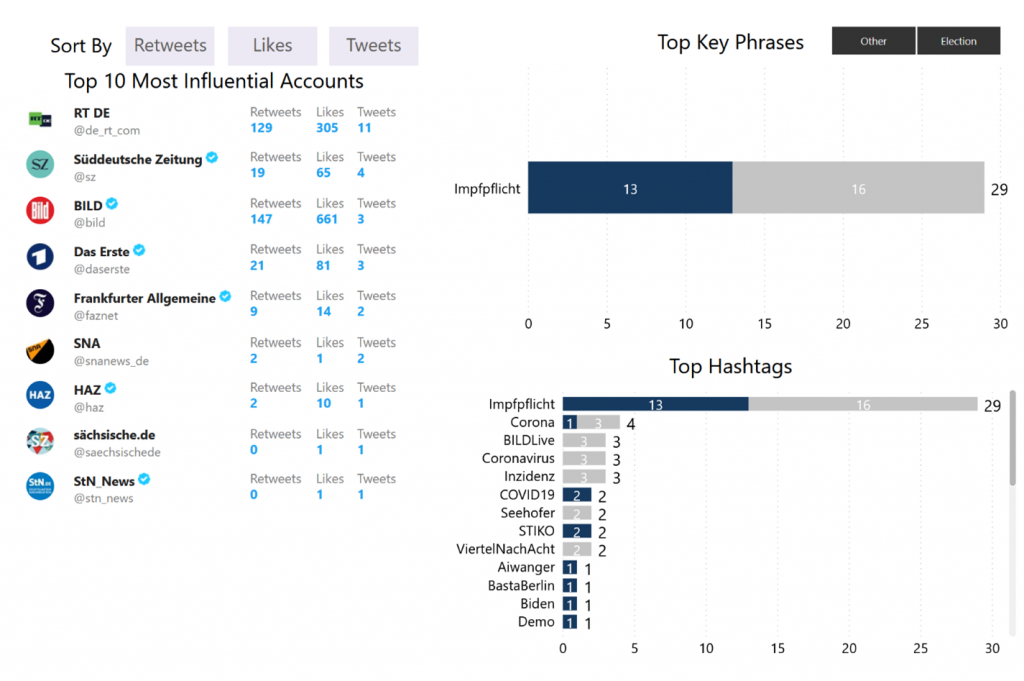
The most influential accounts monitored on the dashboard in August for the keyphrase “Impfpflicht,” sorted by number of tweets.
For the period from April to the end of August, Russian state-backed actors used the hashtag “Impfpflicht” more often than all German media outlets monitored the dashboard combined. Data from the dashboard also shows that Russian-backed accounts started using the hashtag earlier than German media outlets.

German media (left) and Russian state-backed (right) accounts using the hashtag “Impfpflicht,” April 1–August 31.
As there have not been any further moves towards mandatory vaccinations in Germany, Russian outlets continued to cover protests against such mandates abroad. After violent clashes during protests against the German government’s pandemic management in Berlin, RT Deutsch condemned the police’s behavior as undemocratic and disrespecting the rule of law. The tweet considered the incidents to be another step towards a “Demokratur,” a made-up word which is a mix between democracy and dictatorship. When the United Nations Special Rapporteur on Torture and other Cruel, Inhuman or Degrading Treatment or Punishment Nils Melzer announced an investigation into instances of police brutality at the Berlin protest, RT Deutsch shared the article as breaking news on Twitter.
RT Deutsch also condemned European vaccination deals with Pfizer and Moderna as “scandalous crimes,” continuing its negative coverage of vaccine producers from Europe and the United States. Given that RT Deutsch has often questioned the efficacy of vaccines, the article is particularly interesting. It argues against the deals under the assumption that vaccinations are in fact effective and primarily criticizes the terms of the contract. Yet, it does not fail to spread doubts about the vaccines, mentioning that this premise might be wrong after all.
Russian coronavirus-related coverage also received significant attention on RT Deutsch’s YouTube channel. In the month of August, six out of the ten most watched YouTube videos by RT Deutsch were on Covid-19-related issues. In total, these six videos alone had over 1 million views. One video stated that politicians allegedly see the unvaccinated as “lazy, confused, and easy to exclude.”
China
As in July, Chinese state-backed actors focused on the debate around the origin of the Covid-19 virus. “Covid” and “origin” were among the top mentioned key phrases and hashtags used by Chinese actors in August. The month’s top tweet linked to an English-language article by RT.com and accused the United States of abusing the World Health Organization (WHO) for its “anti-China crusade.” This also shows how China piggybacks off the Russian information ecosystem for its own purposes.
Other top tweets also revolved around the origin of the virus, denied any Chinese wrongdoing, and spread the myth that the origin of the virus could be traced back to the Maryland-based Fort Detrick biolab.
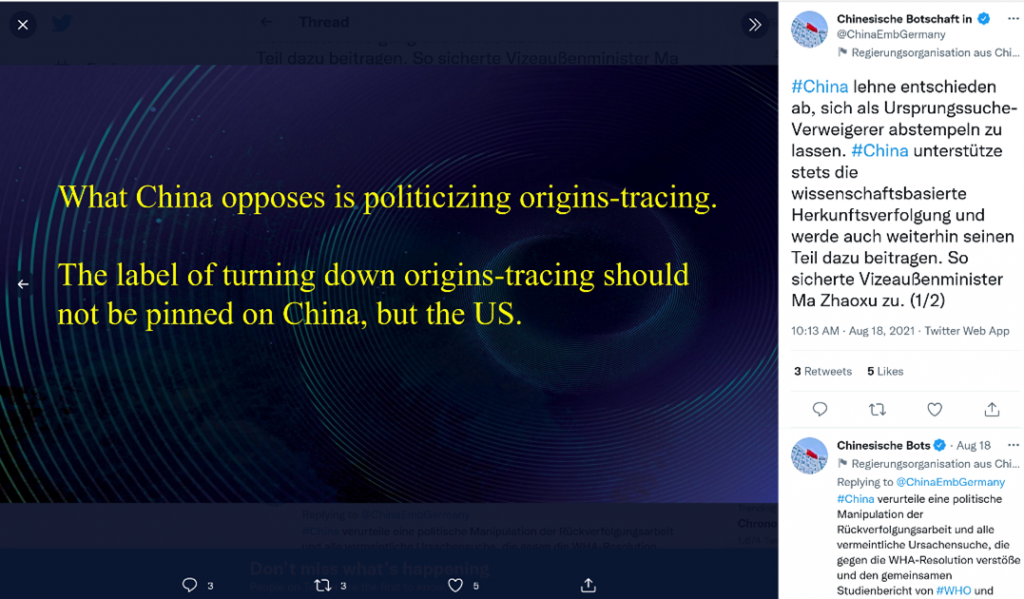
In response to the German frigate “Bayern” departing to the South China Sea in early August, the Chinese Embassy in Germany tweeted out a link to an eleven-page paper asserting China’s territorial claims in the area and accusing the United States of double standards and of being the biggest danger to freedom of navigation in the region. Previously, Chinese actors had not devoted much attention to German foreign policy, with the exception of how Germany perceives the situation in Xinjiang.
Turkey
For Turkish actors, the situation in Afghanistan was the most covered topic in August. Turkish posts focused primarily on the humanitarian situation in the country. One of the top tweets was based on a WikiLeaks document that suggested that Sweden wanted to conduct airstrikes in Afghanistan to increase the marketability of its fighter jets, among other reasons. Other top tweets addressed conditions for Palestinians; TRT Deutsch covered the shooting of a 15-year-old Palestinian by Israelis in the West Bank and a construction project on the site of the Ibrahimi Mosque that the outlet portrayed as a “project of Judaization.” A previous dashboard analysis also tracked Turkey’s focus on the Palestinian issue.
As in previous months, Turkish actors also continued their negative coverage of the Kurdish PKK party, which the Turkish government has labelled a terrorist organization. One tweet stated that the group did not shy away from killing children, while another one insinuated that it might be responsible for the forest fires in Turkey.
Iran
Iranian actors continued to focus primarily on Iranian domestic politics and Iranian foreign interests. The top-mentioned key phrases of the month included Foreign Minister Hossein Amir-Abdollahian, the capital Tehran, and “Raisi,” a nickname for the newly elected president Ebrahim Raisolsadati. August’s top tweet featured the president’s plea for the lifting of sanctions against Iran. Considering the turmoil in neighboring Afghanistan, it was surprising that Iranian actors did not focus much attention on the situation there.

Conclusion
As in previous months, Russian actors continued to disseminate skeptical narratives about coronavirus-related topics with a focus on anti-vaccination stories. Russia also attempted to exploit the turmoil in Afghanistan to sow doubts about the United States as a trustworthy ally and further used the topic to promote anti-immigration messaging in Germany. Despite the approaching election day, Turkish actors refrained from election-specific coverage, while Chinese and Iranian actors have not illustrated any engagement in German domestic policy discourse.
ASD and GMF will continue to closely monitor and analyze foreign interference in the information sphere and will publish an in-depth analysis about foreign actors’ coverage of the different parties, candidates, and potential coalitions ahead of election day.
The views expressed in GMF publications and commentary are the views of the author alone.

